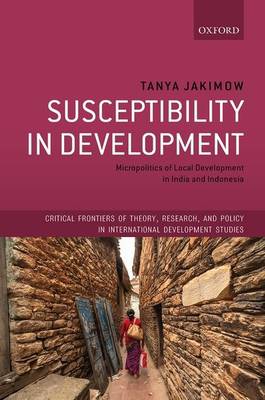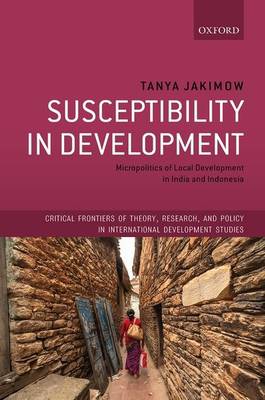
En raison d'une grêve chez bpost, votre commande pourrait être retardée. Vous avez besoin d’un livre rapidement ? Nos magasins vous accueillent à bras ouverts !
- Retrait gratuit dans votre magasin Club
- 7.000.000 titres dans notre catalogue
- Payer en toute sécurité
- Toujours un magasin près de chez vous
En raison de la grêve chez bpost, votre commande pourrait être retardée. Vous avez besoin d’un livre rapidement ? Nos magasins vous accueillent à bras ouverts !
- Retrait gratuit dans votre magasin Club
- 7.000.0000 titres dans notre catalogue
- Payer en toute sécurité
- Toujours un magasin près de chez vous
Susceptibility in Development
Micropolitics of Local Development in India and Indonesia
Tanya Jakimow
177,45 €
+ 354 points
Description
Susceptibility in Development offers a novel approach to understanding power in development through theories of affect and emotion. Development agents - people tasked with designing or delivering development - are susceptible to being affected in ways that may derail or threaten their 'sense of self'. This susceptibility is in direct relation to the capacity of others to engender feelings in development agents: an overlooked form of power. Susceptibility in Development proposes a new analytical framework to enable new readings of power relations and their consequences for development. Susceptibility in Development offers a comparative ethnography of two types of local development agents: volunteers in a community development program in Medan, Indonesia, and women municipal councillors in Dehradun, India. Ethnographic accounts that are attentive to the emotions and affects engendered in encounters between individuals provide a fresh reading of the relations shaping local development. Local development agents may be more 'susceptible' than workers and volunteers from the global North, yet the capacity/susceptibility to affect/be affected orders relations and shapes outcomes of development more broadly. In theorising from the local, Susceptibility in Development offers fresh insights into power dynamics in development.
Spécifications
Parties prenantes
- Auteur(s) :
- Editeur:
Contenu
- Nombre de pages :
- 224
- Langue:
- Anglais
- Collection :
Caractéristiques
- EAN:
- 9780198854739
- Date de parution :
- 06-09-20
- Format:
- Livre relié
- Format numérique:
- Genaaid
- Dimensions :
- 155 mm x 236 mm
- Poids :
- 476 g

Les avis
Nous publions uniquement les avis qui respectent les conditions requises. Consultez nos conditions pour les avis.






